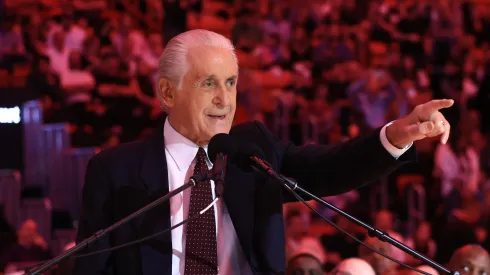The Miami Heat are battling through a tough NBA season, attempting to overcome internal challenges, including the recent turmoil surrounding Jimmy Butler’s departure. The situation has been marked by tension, with Butler’s statements, behavior, and responses from team president Pat Riley making headlines. In typical Riley fashion, he addressed the controversy, revealing that conflict is not only normal but a fundamental part of team dynamics.
Speaking with Dan LeBatard, Riley explained how disagreements are inevitable in high-performance environments and even necessary for achieving greatness. “When you’ve got great ones that accept you—and Kareem [Abdul-Jabbar] could be considered one of the greatest ever—when you’ve got somebody for nine years who supports you, even though he might not agree with you, that’s when the rubber hits the road,” Riley shared. “There’s some conflict there all the time. I’ve had conflict with all my players.”
Riley’s approach is rooted in experience, having been at the helm of some of the NBA’s most iconic teams, including the Showtime Lakers, the New York Knicks, and the Miami Heat. His leadership philosophy, built on managing personalities and fostering growth through confrontation, is a hallmark of his storied career.
Showtime Lakers: Greatness forged through conflict
Riley’s time with the legendary Showtime Lakers in the 1980s exemplifies his belief in conflict as a tool for success. Managing a locker room filled with strong NBA personalities—Kareem Abdul-Jabbar, Magic Johnson, and James Worthy among them—was no small feat. Reflecting on his relationship with Abdul-Jabbar during the interview, Riley described it as both a source of frequent conflict and mutual respect.
“When you’ve got great players who accept you, even if they don’t always agree with you, that’s when the true test of the relationship begins,” Riley said. His ability to challenge stars like Abdul-Jabbar while keeping the team focused on collective goals helped the Lakers win multiple championships and solidify their dynasty status.
Conflict as a catalyst for Growth
For Riley, conflict isn’t a sign of dysfunction but a means to strengthen a team’s dynamic. He believes friction between players, coaches, and executives is inevitable and should be seen as an opportunity for improvement. When managed with the right intent, these tensions can drive teams to achieve their best. This philosophy has enabled Riley to uphold high standards throughout his career, from his time with the Lakers to his leadership of the Miami Heat.
“Greatness isn’t built in comfort,” Riley stated. “I’ve had conflicts with all my players.” To him, even the most successful relationships in professional basketball require navigating significant disagreements. Riley views these moments of tension as reflections of the passion and commitment needed to win, values that define his leadership style.
A unique approach in the NBA
Unlike leaders who prioritize harmony and cohesion, Riley embraces the challenges of managing players with diverse personalities and interests. His tenure with the New York Knicks and Miami Heat demonstrates how this approach can yield results, albeit not without its hurdles.
The recent dispute with Jimmy Butler is a testament to Riley’s consistency. The Heat suspended Butler for seven games following a conflict over contract extensions, a move that some viewed as a sign of internal strife. However, Riley interprets these confrontations as necessary steps in building a durable and successful culture. For him, success is not solely about talent but also about how a team navigates moments of adversity.
